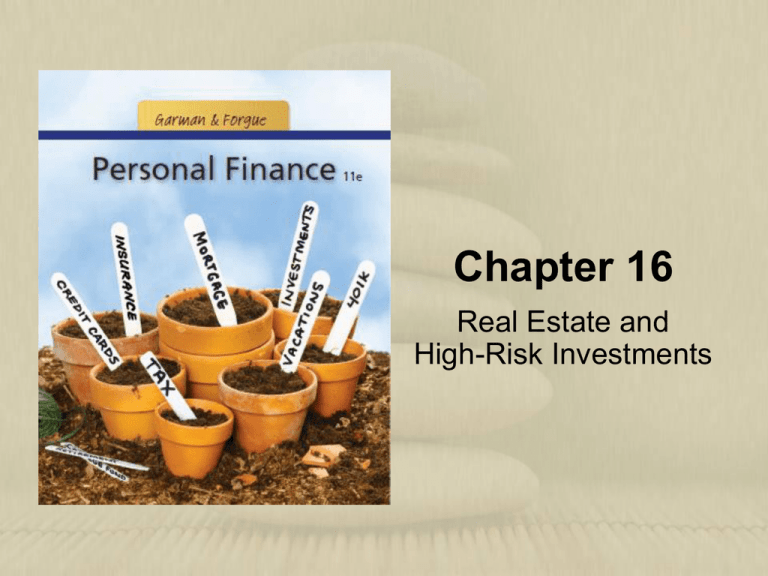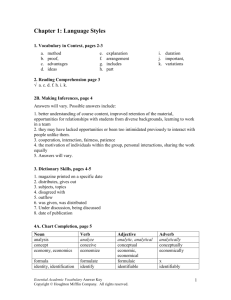
Chapter 16
Real Estate and
High-Risk Investments
Learning Objectives
1. Demonstrate how you can make money investing in
real estate.
2. Recognize how to take advantage of beneficial tax
treatments in real estate investing.
3. Calculate the right price to pay real estate investment
and how to finance your purchase.
4. Assess the disadvantages of investing in real estate.
5. Summarize the risks and challenges of investing in
collectibles, precious metals, and gems.
6. Explain why options and futures are high-risk
investments.
Copyright © Houghton Mifflin Company. All rights reserved.
16 | 2
Making Money Investing
in Real Estate
• Real Estate: property consisting of land,
structures attached to the land, and
accompanying rights and privileges
• Direct Ownership: actual legal title to a property
Copyright © Houghton Mifflin Company. All rights reserved.
16 | 3
Making Money Investing
in Real Estate
• Current income and capital gains
– Rental yield – computation of how much
income the investor might pocket from rent
each year before mortgage payments as a
percentage of the purchase price.
• Average = 4 %
• Values range from 2% - 9%
• Current income results from positive cash flow.
• Capital gains when property is sold.
Copyright © Houghton Mifflin Company. All rights reserved.
16 | 4
Sample Rental Yield Calculation
• Assumes 50% of rental income goes for expenses (not debt)
Copyright © Houghton Mifflin Company. All rights reserved.
16 | 5
Making Money Investing
in Real Estate
• Price appreciation leads to capital gains.
– Capital improvements – costs in making valueenhancing changes beyond normal maintenance and
repairs.
– Repairs – costs necessary to maintain property value
• Leverage can increase an investor’s return.
– Loan-to-value ratio – measures the amount of
leverage in a real estate investment project by
dividing the total amount of debt by the market price
of the investment.
Copyright © Houghton Mifflin Company. All rights reserved.
16 | 6
Making Money Investing
in Real Estate
Beneficial tax treatments:
1. Depreciation Is tax deductible.
2. Interest is tax deductible.
3. Rental income tax regulations on
vacation homes. (Ex: <15 days = no tax)
4. Capital gains are taxed at reduced rates.
(15% vs. ordinary tax rates up to 35%)
5. Tax-free exchanges
Copyright © Houghton Mifflin Company. All rights reserved.
16 | 7
Effect of Depreciation
on Income Taxes and Return
Copyright © Houghton Mifflin Company. All rights reserved.
16 | 8
Additional Effect of
Interest Paid on Income Taxes on Return
Copyright © Houghton Mifflin Company. All rights reserved.
16 | 9
Pricing and Financing
Real Estate Investments
• Pay the right price.
– Discounted cash-flow method
• Financing a real estate investment
– Conventional, fixed-rate mortgage
– Seller financing (or owner financing)
– Sweat equity property
Copyright © Houghton Mifflin Company. All rights reserved.
16 | 10
Discounted Cash
Flow to Estimate Price
• If required rate of return is 10% and purchase price is $200,000:
• Investor should negotiate lower price to be $181K
• Accept less than 10% return on investment
• Hope sales price is higher than $265K in 5 years
Copyright © Houghton Mifflin Company. All rights reserved.
16 | 11
Disadvantages of
Real Estate Investing
• Business risk
• Complexity
• Large initial investment
• Lack of Diversification
• Dealing with tenants
• Time-consuming
management demands
Copyright © Houghton Mifflin Company. All rights reserved.
16 | 12
Disadvantages of
Real Estate Investing
• Low current income
• Unpredictable costs
• Interest rate risk
• Legal fees
• High Transfer Fees
• Illiquidity
Copyright © Houghton Mifflin Company. All rights reserved.
16 | 13
Investing in Collectibles,
Precious Metals, and Gems
• Collectibles: cultural artifacts that have value because
of their age, scarcity, etc.
• Making a profit on collectibles is not easy.
• Buying and selling collectibles on the ‘Net: easy and
convenient, but not always safe!
• Gold and other metals:
http://www.cmegroup.com/trading/metals/precious/gold.html
– Gold bullion, gold coins
– Gold stocks and mutual funds
– Silver, platinum, palladium, rhodium
• Precious stones and gems: diamonds, sapphires, rubies,
etc.
Copyright © Houghton Mifflin Company. All rights reserved.
16 | 14
Investing in Options
and Future Contracts
• Derivative (or Derivative Security) – an
instrument who’s value is based upon another
underlying asset.
– Ex: Mortgage backed securities, stock options, etc.
• Options allow you to buy or sell an asset at a
predetermined price.
– Stock Option – Security that gives the holder
the right to buy or sell a specific number of
shares of a certain stock at a specified (strike)
price before an expiration date.
Copyright © Houghton Mifflin Company. All rights reserved.
16 | 15
Investing in Options
and Future Contracts
• Options are created by an option writer.
– Option premium – the price of the option
– Option holder – person who buys option
– Call option – the right to buy the option asset at a
strike price at any time before expiration
– Put option – the right to sell the option asset at a
strike price at any time before expiration
• Conservative writers profit by selling covered calls.
– Covered Option, Naked Option – The option owned
by the writer who can settle a contract with minimal
risk. Naked option is not owned by the writer and is
speculative with regard to risk.
Copyright © Houghton Mifflin Company. All rights reserved.
16 | 16
How to Make Sense
of Option Contracts
Copyright © Houghton Mifflin Company. All rights reserved.
16 | 17
Commodities Futures Contracts
• Futures Contract – Type of exchange traded
forward contract that specifies the size of the
contract, quality of product to be delivered and
delivery date.
– Agricultural, commercial and mining products
• Economic need creates futures markets.
• Speculators may trade in futures markets.
• Futures are a zero-sum game. – The wealth of
investors remains the same; the trading simply
redistributes the wealth among the traders. Each
profit is offset by an equal loss.
Copyright © Houghton Mifflin Company. All rights reserved.
16 | 18
The Top 3 Financial Missteps
In Real Estate and Investing
People experience challenges in investing in real
estate and high risk investments when they do the
following:
1. Fail to factor in income lost due to vacancies
and collection costs for tenants who do not
pay.
2. Fail to set enough money aside for
maintenance, repairs, unanticipated capital
improvements, and rising real estate taxes.
3. Assume that real estate prices will go up and
interest rates will not increase.
Copyright © Houghton Mifflin Company. All rights reserved.
16 | 19
Good Money Habits in Real Estate
and High-Risk Investments
• Consider the disadvantages before investing in real
estate.
• Invest only in real estate properties that have a positive
cash flow.
• Finance real estate investments with conventional
mortgages, not mortgages with adjustable interest terms.
• Use the discounted cash-flow method to help determine
the right price to pay.
• If you put money into high-risk assets, limit your
investment to no more than 10 percent of your portfolio.
Copyright © Houghton Mifflin Company. All rights reserved.
16 | 20

